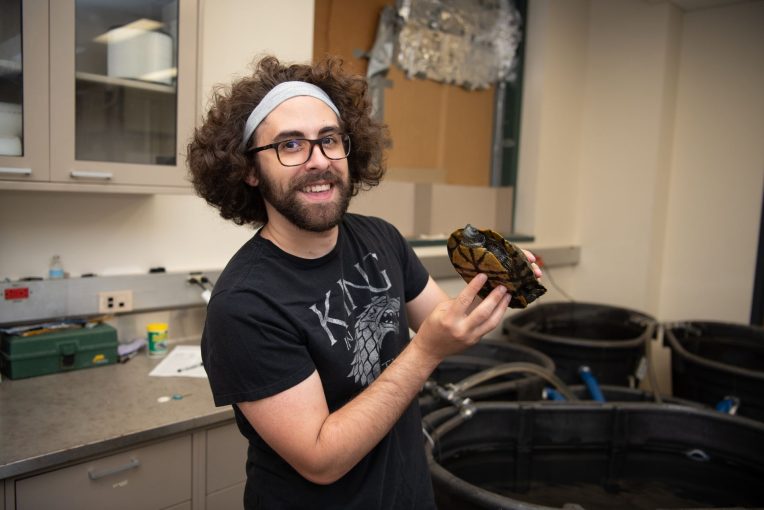The winner of the 2023 Clarence W. Sorensen Distinguished Dissertation Award is Dr. Anthony (Tony) Breitenbach, Ph.D. ’22, who earned his Doctor of Philosophy in the School of Biological Sciences.
Before coming to Illinois State, Breitenbach grew up in eastern Indiana near the Ohio border. He was a biology major and double minor in chemistry and history at Indiana University East, from which he graduated with honors in spring 2016. During his time as an undergraduate, Breitenbach was a student tutor, an ambassador for the admissions department, and a supplemental instructor.
After completing his undergraduate degree, Breitenbach came to Illinois State and joined Dr. Rachel Bowden’s lab in fall 2016 and later added Dr. Ryan Paitz as a co-adviser in the School of Biological Sciences. During his time in graduate school, Breitenbach taught labs for non-majors in biology, ecology, and invertebrate zoology, and was the instructor of reference for non-majors in biology for two semesters. Breitenbach also served as the Phi Sigma Biological Honors Society president from 2021-2022 while completing his graduate degree.
The research that Breitenbach focused on deals directly with temperature-dependent sex determination. In numerous reptiles and even some fish, whether an individual develops as a male or female depends on the temperatures individuals experience while they’re embryos.
An example of this is in many species of turtle, including the red-eared slider turtle, cool temperatures inside the nest cause individuals to develop as males while warm nest temperatures cause individuals to develop as females. This is referred to as temperature-dependent sex determination (TSD). Most of what we know about how TSD operates comes from laboratory studies that incubate eggs at constant temperatures, which are not comparable to the nest temperatures that individuals experience in nature since temperatures rise and fall on a daily and seasonal basis.
This is concerning because as climate change continues, organisms will likely be exposed to longer, hotter, and more frequent heat waves, and this could cause species like the red-eared slider turtle to produce only female hatchlings. Therefore, it’s critical for us to further our understanding of how TSD operates under more natural conditions so we can accurately predict how these species may respond to climate change.
Breitenbach’s research uses the red-eared slider turtle and fluctuating (rising and falling) incubation temperatures to investigate how certain heat wave dynamics such as timing and continuity affect 1.) the number of female hatchlings produced and 2.) the expression of genes involved in gonadal development. His research adds to a growing body of knowledge that will allow us to more accurately predict how TSD species will respond to climate change.
While working on finishing his doctoral degree, Breitenbach was able to work with two experts in the field of TSD. Bowden and Paitz mentored and advised Breitenbach and worked to make sure he got plenty of hands-on experience during his studies.
“Their mentorship and advising made my graduate school experience everything I wanted it to be and more,” Breitenbach said. “They guided and promoted my development as a scientist, celebrated my successes, and helped me get my feet back under me during my failures. I take a lot of pride in having Rachel and Ryan as my advisers for my Ph.D. I will carry this pride for the rest of my life, and I’m truly grateful for them.”
His faculty mentors and unique class experiences are not the only things that have made Breitenbach’s time at Illinois State special. He also accredits the friends he has made along the way to his overall success at Illinois State. “My favorite part of my six years in graduate school has been all the friends I made along the way. I’ve made some of the best friends of my life and connections that will last a lifetime. These friends and connections have been and continue to be extremely positive influences in my life: I’ve learned a lot from them, I’ve made great memories with them, and they’ve helped me develop as a person.”
The research Breitenbach is focusing on has the potential to greatly impact the study of temperature-dependent sex determination. The more society knows about how TSD operates under natural temperatures, the better we will be able to predict how these species, whose development is closely tied to climate, may respond to a rapidly changing climate. It may be possible in the future that we will need to collect eggs from TSD species and incubate them under controlled conditions in laboratories to make sure both sexes are being produced. In other words, the greater our understanding of how TSD operates in nature, the better the chance we have of protecting these species from climate change.

